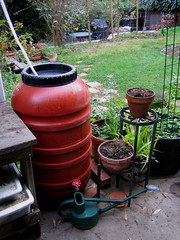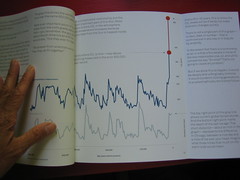A Hoarders Guide To The End Of The World
Mention the word "hoarder" in a meeting of organizers and a collective shiver will run down our spines. A hoarding client's clutter brings us head to head with a vision that is out of balance. Whether a result of unconscious compulsions, chronic shopping, expectations that don't ad up or an inability to reconcile cause with effect, it all comes to bear on the limits of space. But even clients who are not hoarders can manifest hoarding impulses that seem perfectly rational at the time.
"What about this?" I asked a client, while holding up a restaurant size can of garbanzo beans. It turned out to be one of those "just in case the worse happens" purchases—earthquake, terrorist attack. I asked if she was planning to feed the whole neighborhood. No, not that generous. Then I pointed out that, in an emergency, we would very likely not have power and this giant can of garbanzo beans, once opened, would quickly go bad without refrigeration.
"You know what?" she said, "I just bought it because it was on sale. Put it in the donation box."
Hoarding does have its place. Once human society was able to "hoard" enough grain to feed the village, the villagers were buffered from starvation in times of crop failure. The ability to hoard successfully allowed civilization to bloom. When not everybody had to spend their time foraging for food, some of those villagers could become priests, heads of state and bureaucrats. Trade ensued which led to empire building.
It is sensible to have food on hand. Water too. Enough for seventy-two hours in case of earthquake or hurricane we are told. I grew up with longer parameters. Rice was delivered to our house in burlap sacks hefted on the shoulders of a sun-darkened man coming into our kitchen. The cook would lift the lid of a wooden barrel and in would go a river of white rice. When the bin was full, I would thrust my arm, repeatedly, into the hard grains up to my bicep until the cook chased me away.
Water was collected in giant steel cubes, towering over my head; two of them side by side with gutters connecting them to the roof. We had plumbing from the city water system, but it was unreliable in those days, before Thailand had attained the status of an industrialized country.
This fall, before the rains came, I installed rain barrels to collect water from our roof. I got 55 gallon barrels from an enterprising young man, who works at a food processing plant. The empty plastic barrels he saved had contained olives from Greece and artichokes from Argentina. They were handsome barrels with urn like shapes; I got one in a terra cotta color and two in gunmetal grey. I installed spigots near the bottom of each and connected them to the downspouts from our roof. The first rainfall filled them. The water would need treating to be safe to drink, but it's fine for watering the garden, washing muddy tools and, should our water supply be interrupted, flushing toilets.
But not to worry, if you're like most, you have saved plastic bags. Nearly every house I enter has a bag o' bags. No one quite knows why, but when it comes down to that "just in case" day of reckoning, the true destiny of those bags will come to light. You'll be using them to poop in. I prefer a composting toilet, employing a 5 gallon plastic bucket filled with sawdust. (I've scouted out a local cabinet shop for the sawdust.) You can even buy a snap on toilet seat designed for said bucket. For instructions on safe handling and maintenance, I highly recommend "The Humanure Handbook" by Joseph Jenkins.
Books are a popular hoarder item. It is possible to stack them waist high before they fall over. I am hard put to place a limit on books, but purge diligently to make room for those that contain useful instruction—identifying edible plant species, for example, or how to cook with dried grains, practice wilderness medicine, use homesteading skills or build a houseboat.
Where once putting up preserves was the norm, we've now lost this connection to a land base. The facade of supermarkets with their displays of abundance, never betray a day of want. This year a hard freeze impacted 80% of California's citrus crop, but we won't see that reflected by empty shelves at local stores. Our long supply lines keep those shelves filled, contingent on the cheap price of oil.
Recently a neighbor popped her head over the fence at my mother's house and asked me if I would like a box of Mason jars. She used to can peaches that she collected from the park across the creek. Then the park became county property and all the non-native species—the fruit trees—were cut down. Boy, was that a mistake, I thought, and gladly accepted the Mason jars.
At my childhood home In Bangkok, large ponds ran along the fence all the way to the kitchen; in them we had a fish population fed on scraps direct from the cook's cutting board. We probably could have caught them and eaten them in times of political uprisings when no one ventured beyond the compound gates, but no tanks rolled into Bangkok during my childhood.
"If we grew our own fish would you eat them?" I asked Catherine. The question stumped her, but I have that kind of foragers mind. I read "Never Cry Wolf" about the naturalist who set out to prove that wolves lived on rats and did not kill humans, livestock or pets. To prove that a large mammal could, indeed, live on rodents, he did it himself. The book included recipes. I made note of mouse stew. Meanwhile I combed Goodwill for suitable containers in which to store rice. Their shelves were filled with matching sets of bulk food containers. Keeping food in bulk is not something people do anymore. Instead they prefer to keep, mementos, magazines and media.
Recently I worked in a trails home, so called because the house is so filled with stuff that there are paths cleared between the clutter to get to the couch, the fridge and the bed. I suggested that we clear the TV room of old videotapes. As we carted out over ten bags of tapes that they no longer had time to watch, I chuckled when I came across a video of the old TV show "That Girl". Yes I, too, might well be tempted to purchase a boxed set of my favorite show "The L Word", but by the time season four is over I will, not only have all the episodes memorized, I will also be able to quote the commentary of my favorite L Word blogger, the notes from the director's podcast, interviews with the actors and reactions from the fans. This could prove useful when we no longer have reliable power and have to act out our own entertainment.
For power—electricity—is the weakening lynch pin upon which our entire industrialized, information age exists. I was shocked to learn, from an article in Fortune magazine, the electricity requirements of a server farm. Our taken-for-granted-because-it's-free, Googling habit is activating 7,000 computers with every search plus the 15,000 that patrol the net for updates. Buildings the size of seven Costco stores, filled with computers running so hot, that for every dollar of power spent to run the computers, a dollar must be spent to keep them cool, are sitting out there somewhere to support my You Tube addiction and all the other online activities of this growing-exponentially, globalized, outsourced-to-India online world. Some 30 megawatts of power are required per server farm—enough to power 30,000 homes. The companies of MicroYahooGlesoft, with their major computer databases, are combing real estate markets for locations with cheap plentiful power.
Such investment in complexity is a component of why societies collapse, according to collapse scholar Joseph Tainter. As he explains, increased complexity leads to diminishing returns, until more and more resources and energy are needed just to maintain the status quo, leaving no reserves to deal with any new demands or emergencies. At a certain tipping point, rapid disintegration results. Will innovation kick in before that point? We shall see.
Global warming has pumped up heat waves and storms that have interrupted our power supply, thus justifying my collection of flashlights and lanterns. Camping stoves of all kinds, a hand crank non-electric clothes washer, hand crank radios and flashlights, a 12 volt TV (to plug into the car), hand tools, a push mower and a carpet sweeper fill my storage space. Also glues, adhesive tapes and hardware to fix things. If supply lines are hampered by catastrophe, items made with a sophisticated level of high tech production, like duct tape and Shoe Goo, will be scarce.
Much more common in recent history and much less discussed is the possibility of economic collapse, especially given our nations' huge debt and runaway war costs. The experience of the USSR is rich with details of their collapse, offering helpful tips. To fend off the effects of economic collapse, often accompanied by currency collapse, the savvy hoarder can invest in bartering items. Where traditional collectors invest in "collectibles" and antiques, these items are still based on a viable currency. One client's collection of Bart Simpson toys in their original packaging might get him top dollar today, but will likely not cut it as a bartering item. Better that he should have been obsessed with rechargeable batteries and solar chargers.
By now, my colleagues, especially those who have embraced, cult-like, the message of the online movie, "The Secret", will be collectively shaking their heads. Hoarding items that come free is typical behavior, but actually buying expensive items. that one doesn't need, for disaster scenarios most deem unlikely, indicates a serious crossing of the line. The universe will provide all that you need, preaches "The Secret", as long as you set your intentions properly and keep sending out those positive thoughts.
Given the incoming news of planetary climate change, escalation of the instability in Iraq to neighboring countries and the shuddering of the stock market, somehow thinking positive thoughts seems disingenuous as if we're to say, "so what, I'm still going to get what I want before I'm impacted by all this".
I believe in an abundance of love and the deep potential of the human spirit to connect with all life, but we are embedded in a resource-extracting, growth economy where solutions to problems and the successes we envision often mean a higher level of consumption and energy use. When our complex society is forced to decelerate, it might not be such a bad thing.
Wrapping my mind around disaster scenarios exercises my brain, and keeps it flexible. It helps me to reclaim power in the face of George Bush's America. If society is going to collapse, it would be good to know the story about how we got there and what we might do about it. Otherwise the most vocal among us will grab the podium and blame it all on gay marriage.
The following books informed this essay:
The Collapse of Complex Societies by Joseph Tainter
Collapse: How Societies Choose to Fail or Succeed by Jared Diamond
Powerdown: Options and Actions for a Post Carbon World by Richard Heinberg
The Long Emergency: Surviving The Converging Catastrophes of the Twenty First Century by James Kunstler
The Last Hours of Ancient Sunlight: The Fate of the World and What We Can Do About It Before It's Too Late by Thom Hartmann
An Inconvenient Truth by Al Gore
The Weathermakers: How Man is Changing the Climate and What It Means For Life On Earth by Tim Flannery
The Revenge of Gaia: Earth's Climate Crisis & The Fate of Humanity by James Lovelock
Strangely Like War: The Global Assault on Forests by Derrick Jensen and George Draffan
Shoveling Fuel For A Runaway Train: Errant Economists, Shameful Spenders and A Plan to Stop Them All by Brian Czech
What Every American Should Know About Who's Really Running The World: The People, Corporations and Organizations That Control Our Future by Melissa Rossi
Endgame: Volume I: The Problem of Civilization by Derrick Jensen
Endgame: Volume II: Resistance by Derrick Jensen
Emergency Food Storage & Survival Handbook by Peggy Layton
Deep Survival: Who Lives, Who Dies and Why by Laurence Gonzales
Going Local: Creating Self-Reliant Communities In A Global Age by Michael Shuman
The Great Turning: From Empire to Earth Community by David C. Korten
Dominion: Can Nature and Culture Co-Exist by Niles Eldredge
Planet of Slums by Mike Davis
also posted at energy bulletin







2 Comments:
Thank you Sushil. That it a very thougt provoking article. I'll try not to take it personally. I am picturing you spinning thread all day and meditating for two hours every morning and evening.
"For power—electricity—is the weakening lynch pin upon which our entire industrialized, information age exists"
and the enumeration of stats
YEOW! Thanks
Post a Comment
<< Home